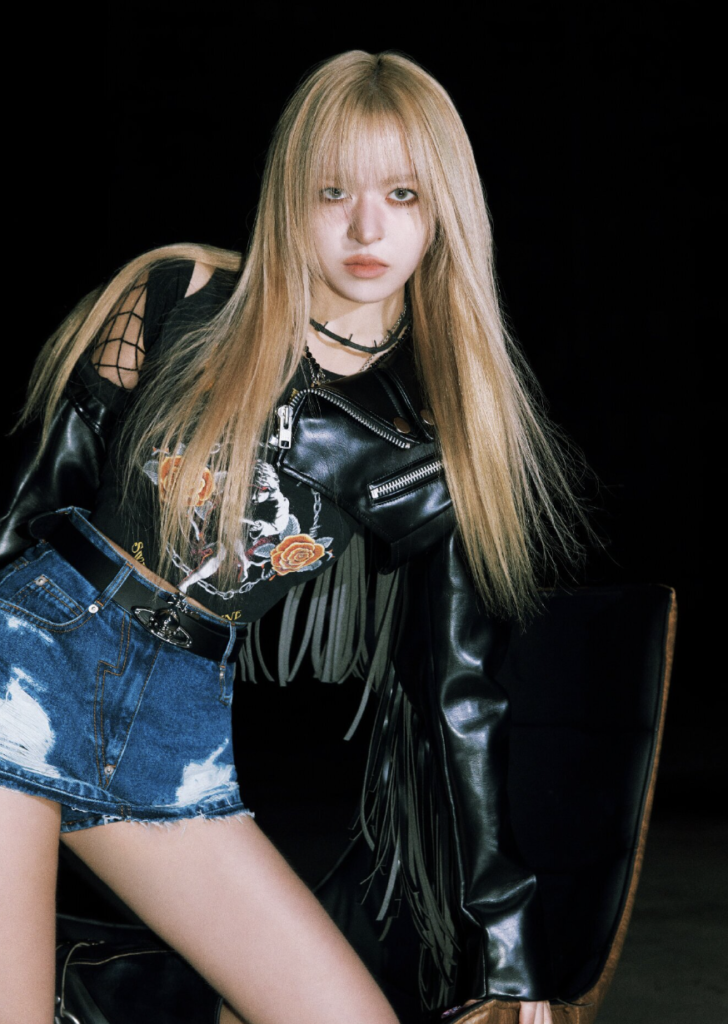
NMixx debuted in 2022 and coined the term “mixx pop”, which splices together elements from two or more genres. Their first few title tracks, “O.O” and “Dice”, were divisive because the switch-ups felt jarring for many listeners. The group’s emphasis on experimentation also initially overshadowed the members’ talents, especially their strong vocal ability.
After a few comebacks veering away from the concept (“Love Me Like This”, “Party O”Clock”), Fe304: Break marks a return to “mixx pop”, but executes the change-ups more smoothly than in the group’s early title tracks.
In pre-release single “Soñar (Breaker),” for example, the switch-up from Latin-inspired beats to dreamy UK garage occurs at the beginning of the second verse, and segues back out at the pre-chorus. The shift also parallels a change in perspective: the first verse reflects the determination of one who wants to “break out of orbit towards what we’ve dreamed,” while the second verse is from the point of view of someone beckoning from the dream world. While transitions happen within the song, the BPM remains consistent throughout the song, making it feel more cohesive.
Title track “Dash” also includes a change-up at an intuitive point at the song (the bridge), though its pacing has mixed results. Up until its bridge, “Dash” has an R&B/hip-hop sound with appealing jazzy vocal runs in the verses and a sing-talky chorus of “Dash I wanna dash I wanna run it.” The chorus grows repetitive, but the song plays with it after the second verse, slowing down the chorus and then resuming its original tempo after a short pause. The shifts in tempo mimic the line “zero to a hunnid.”
At the bridge, heavy guitars kick in, while layered vocals create a floating feeling. With the change-up happening at the bridge, however, there is little time to process the new section before the song quickly ends before the 3-minute mark. There are many elements to admire in “Dash,” particularly the vocal performance, but the song could have used some trimming of the chorus and a longer bridge for a perfect balance of all of these elements.

The first half of the album emphasizes forward momentum, and “Boom” might be most successful in conveying that musically. The song, composed and arranged by Ryan Jhun, is driven by 808 beats and occasional bleeps, sirens, and booming bass and percussion underscoring the lyrics “tick tick boom.” The production becomes fuller to accompany Haewon’s and Lily’s vocals in the post-chorus. The outro, however, is where “Boom” thrills, as the BPM suddenly speeds up in the album’s most surprising but satisfying twist. Fueled by club beats, the members alternate singing “Ooh, baby, ooh, ooh / Tick-tick-tick-tick, boom, boom” as though something is about to explode. Even when singing simple onomatopoeia, the NMixx members effectively convey the feelings required for the track.
“Boom,” “Dash,” and “Soñar” all contain transitions in either genre or tempo, but even the songs without them still involve exploration of new genres for the group. Notably, “Run for Roses” incorporates country influences with fiddle, banjo, and electric guitar. The title refers to an idiom for a hard-fought competition, and the song conveys this feeling of persevering through challenge. It begins dramatically, with Bae singing a capella in her lower register before the guitar propels the song forward. The group utilizes their full vocal range for maximum intensity, soaring in a melodic chorus: “We’re alive because we are not alone. We run for roses.” Lily’s melismatic delivery also stands out with her runs of “oh” in the beginning of the second verse.
The resilience implied in Lily’s runs is reinforced in the lyrics sung by Kyujin in the second verse (which were co-written by Day6’s Young K):
Surrounded by thorns, our finish line
But I still go
Scratched, hurt, doesn’t matter, put aside giving up
No, no, no, no, no, no, no

The lyrics create a thematic through line with previous songs like “Dash.” This helps with cohesion in an album that jumps from genre to genre, allowing a unique and compelling song like “Run for Roses” to stand on its own.
The last three tracks are less experimental, but they aptly showcase NMixx’s versatility. The effervescent “Passionfruit,” sure to be a favorite for many listeners, combines East Coast Club beats, rap refrains from Jiwoo and Kyujin, and a breezy, infectious hook. The beats and mellow, fresh-sounding vocals are both currently on trend, but feature enough textures and details to differentiate it from other similar songs. Meanwhile, groovy R&B track “XOXO” particularly stands out for its vocals in the chorus, with light, airy harmonies sung in counterpoint to bolder vocals from Lily, Kyujin, and Haewon.
“Break the Wall” closes the album with a hopeful and bright anthem. Thematically, it feels like a culmination of the album’s focus on racing to achieve one’s dreams. As Haewon declares in her a capella intro:
I know a world endlessly unfolds for us
‘Cause now we break all the walls
We break the–

“Break the Wall” sees the story of success as one that is shared with the listener. As Sullyoon’s line advises us, “Gaze far away, say goodbye to hesitation.” Musically, the song builds in energy and intensity, as plucked strings and synths in the verses and pre-chorus give rise to full pop rock instrumentation and powerful stacked vocals. The final chorus and post-chorus particularly ascend, ending the song and the album on a triumphant note.
Fe304: Break is NMixx’s best work to date, with impeccable mixing and production pulling off the group’s experimentation like never before. The album should dispel any doubts that listeners have about the “mixx pop” concept. With its variety of genres and vocal style, the album also demonstrates the members’ incredible range as vocalists and performers. That versatility is becoming key to NMixx’s artistic identity as a group who can perform in nearly any style.
(YouTube. Lyrics via Genius [1][2][3]. Images via JYP Entertainment).


